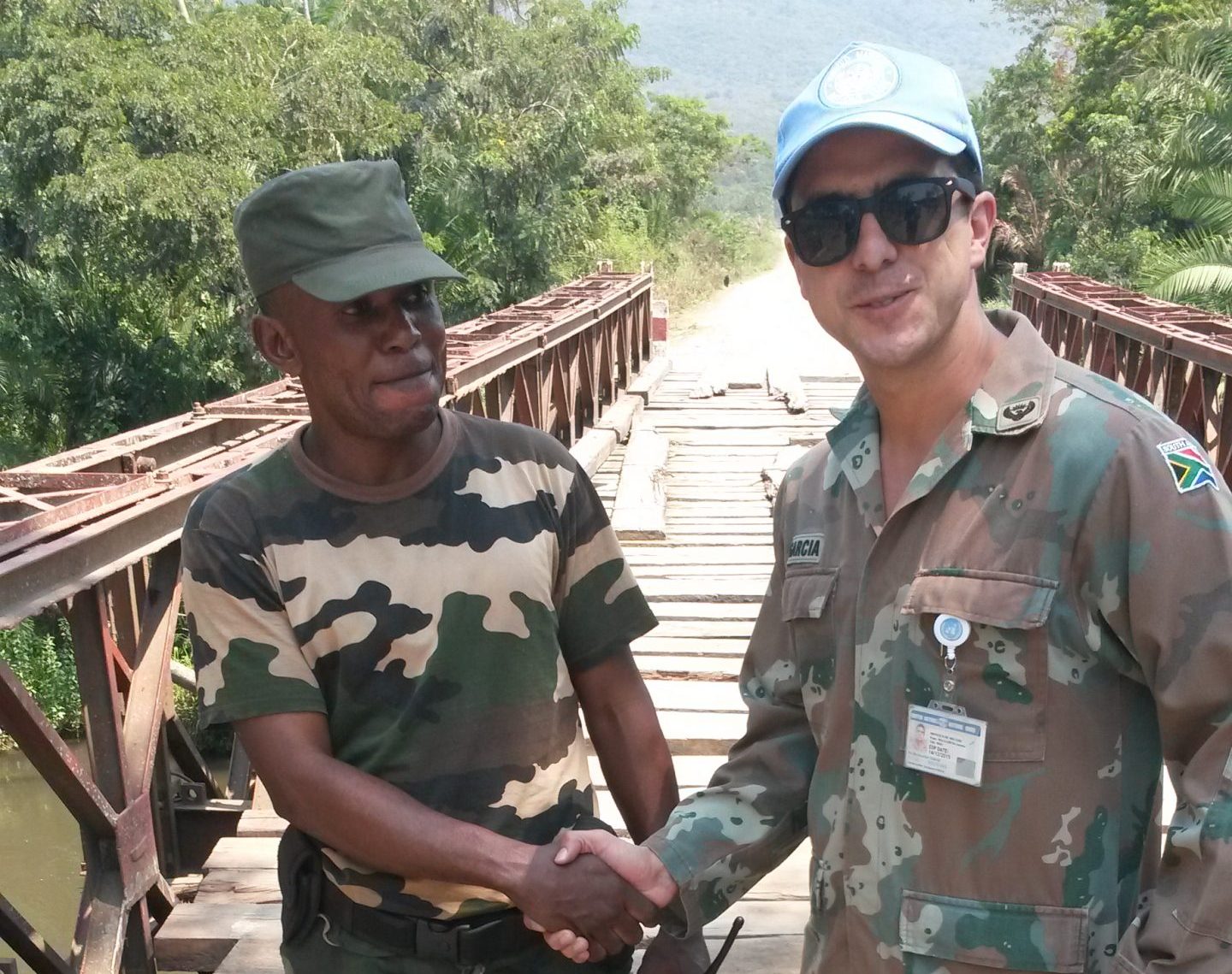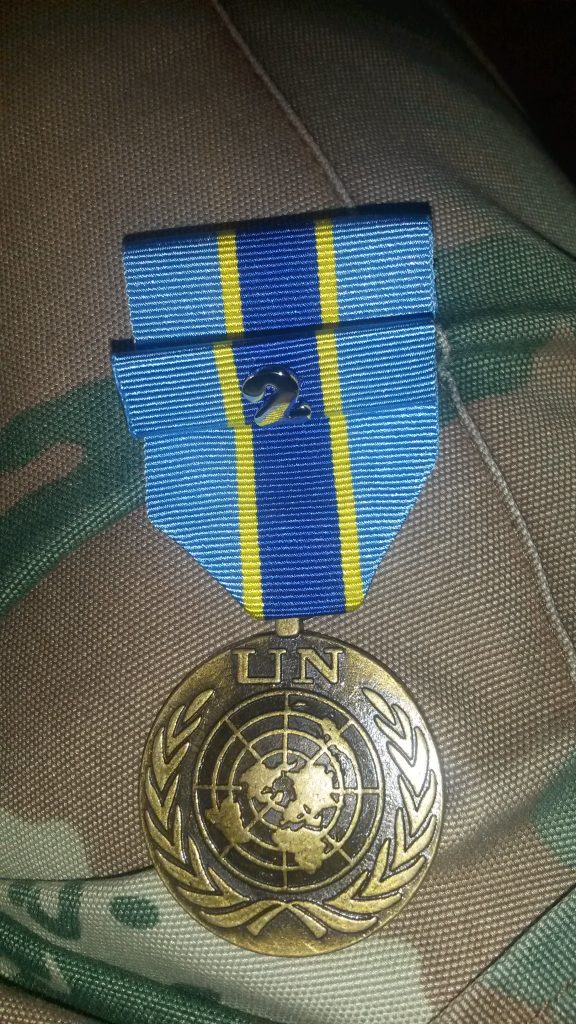
Photo: Antonio Garcia
Dr. Antonio Garcia is a non-resident research fellow at Stellenbosch University in South Africa, and a tutor at the Open University. He is a civil servant and visiting lecturer at Durham University. Dr. Garcia has successfully led the delivery of a number of programmes, and projects, in national and international roles, including UN Peacekeeping, international NGOs, the civil service and the military; as well as working at the intersection of international peace, security, and education. We talked with Dr. Garcia about his book “South Africa and United Nations Offensive Peacekeeping Operations”, history of peacekeeping missions during the Cold War, actual and future challenges…
THA: For starters, congratulations on publishing a very interesting book. What would you highlight as the most important aspect of it?
Thank you. The most important part of the book is the concept of developing and iterating ideas about offensive action, whether in war or other types of operations. In this particular study, I focused on South Africa and the United Nations where an offensive model was proposed and applied.

Ultimately achieving peace in Eastern DRC will happen at the negotiating table and this is where the UN should have considerable influence.
Dr. Antonio Garcia
Photo: Antonio Garcia
I referenced operations in the Democratic Republic of the Congo, where the M23 armed group advanced on Goma in 2013. The M23 committed gross crimes against the civilian population. There was a strong response to this by African regional, as well as international actors and a decision was taken to employ an offensive force, although in a peacekeeping mission, to neutralise this threat. My book considers the operational and conceptual process of preparing for and deploying the right forces to neutralise the threat – through the lens of the South African military. Now about a decade later the M23 have resurfaced, and are again destabilising eastern DRC. The previous tactical success was not followed up in military strategic or political terms, which allowed for their reincarnation. The current use of regional forces apart from those in the UN mission, shows how the initiative of offensive operations should be well thought through, planned, and budgeted for, and ultimately how the UN is not ideal for housing such a mechanism. Ultimately achieving peace in Eastern DRC will happen at the negotiating table and this is where the UN should have considerable influence.
Mixed Record of the History of Peacekeeping
Dr. Garcia emphasizes the history of peacekeeping missions had both successes, but also catastrophes…
THA: You are also a military historian. What do you think, how much can a peacekeeping mission influence the security (and political) situation in a certain area?
The history of peacekeeping in the 20th century has mixed record. The majority of Cold War peacekeeping missions took place in the shadow of Soviet and Western geo-strategic tensions, with a divided Security Council. There were successes, which often took the shape of peacekeeping missions guiding a state through an interim phase of governance, often but not always from an oppressive ruler/government into a new moment. Examples of the change of Namibia from German South West Africa; The UN Transition Authority in Cambodia, and the UN mission in East Timor are examples of such. There are also examples of where a peacekeeping mission is deployed into complex and high intensity security situations e.g. Central African Republic, Mali, and earlier on in Somalia. Historically the UN have not performed well in these contexts. Additionally there have been significant and high profile catastrophes where the UN have failed to effectively respond – the genocides in Rwanda and Srebrenica are cases of such tragedy.
I think a peacekeeping mission can have an influence on the security as well as on the political situation of the country in question. Much of this depends on the specific contexts and importantly the people involved.”
THA: And now, from a historical perspective, has the influence of peacekeeping missions in certain areas changed since the Cold War?
Yes, I think that since the Cold War, the influence of peacekeeping missions have had a patchy record, but that is not to say that there have not been successes. Although the genocide in Srebrenica was an inexcusable tragedy, the mission in Bosnia, with NATO support had some positive results, as well as relieving the siege of Sarajevo. The peacekeeping mission in Burundi, and the transitional governance UN missions had generally positive results. Peacekeeping missions in high intensity and complex security settings generally struggle to establish themselves, and their legitimacy. The reasons for this are also complex and link to having no peace to keep, lack of protection of civilians, taking sides in an ongoing conflict and good offices being compromised.
Peacekeeping Missions: Cold War and Today
Dr. Garcia was deployed on two challenging but fulfilling peacekeeping missions. “I think that the situation in Darfur is complicated and the famine related conflicts of the mid-1980s has continued into the post-Cold-War period…”, he says.
THA: Your bio says you were deployed on two peacekeeping missions. How challenging was it to serve there?
It was challenging but fulfilling. I am proud of the work we did both in DRC and Darfur. In the Congo, I was a military engineer, and the work I led in building bridges and other infrastructure facilitated humanitarian, military and mission aid to reach the people.

I look back on this work now and in some ways it is hard to imagine that I was actually there. The main challenges on the political level were divisions between the leaders, the mission, and local groups. The lack of services and security enabled ongoing cycles of violence.
THA: Would you say the situation in the areas where you were deployed has changed since the Cold War? For better or for worse? Are these areas more secure now?
I think that the situation in Darfur is complicated and the famine related conflicts of the mid-1980s has continued into the post-Cold-War period peaking in and around 2003 with the Sudanese Government Janjaweed committing gross crimes against humanity. I was there 2010-2011, during a tricky time, and I saw the suffering and the harsh conditions left behind by years of war. At this same time the politicians were finalising another attempt at the Doha peace accords. Despite this and other attempts at peace hostilities continued.

There are continuities of conflict, and attacks against the civilian population in Darfur. With the withdrawal of UNAMID, and news of ongoing low-level conflict, it saddens me that this area is left unprotected, and unprepared – as a world, it is another failure for the UN, and for the African Union, despite attempts to portray it as a success.
Challenges and Threats
IEDs and ambushes are some of the greatest challenges these areas face today. IEDs, or improvised explosive devices, cause considerable damage.
THA: Do the officers (and soldiers) deployed in these military missions face greater challenges today than in, let’s say, the 1980s, the Cold War years? What do you think?
Yes, military personnel face greater challenges in modern peacekeeping missions in complex security environments. The use of IEDs and ambushes have led to considerable casualties in CAR, and Mali.
THA: What are still the biggest security threats for these areas?
The biggest challenge are improvised explosive devices (IEDs). The use of such devices are relatively easy to use, and apply. They cause considerable damage and they are difficult to neutralise and mitigate.
THA: In your opinion, do the countries of the former Cold War blocs still have influence there?
The West in broad do not provide boots on the ground. That is to say blue helmets are generally provided by the developing world and the Global South. The West and former Soviet states generally provide staff officers, military observers and advisors. The UK has taken the bold step of deploying companies of military engineers to peacekeeping missions, which shows a change. There are also attempts at training other countries for deployment in peace missions.
THA: And one more question, what are the biggest political and security challenges peacekeeping missions in these areas will face in the near future? Is there perhaps something that can be learned from historical examples?
The biggest lessons are that any opportunities created by boots on the ground need to be consolidated by political processes. In doing this being inclusive is important. The UN, and international diplomats need to become better at establishing links with all actors, and building those relationships in order to facilitate negotiations.
Antonio Garcia | South Africa and United Nations Offensive Peacekeeping Operations
